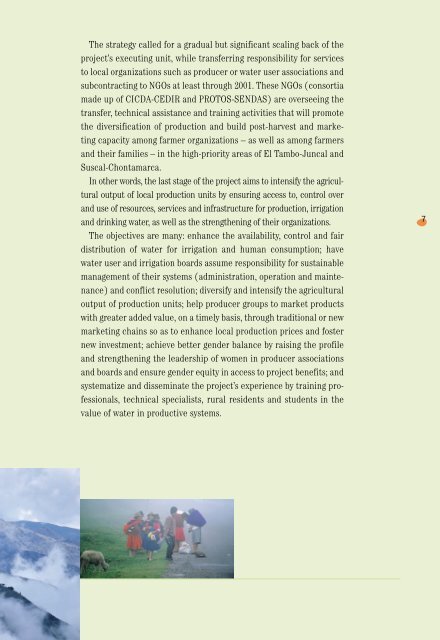mishqui-yacu, sweet water - IFAD
mishqui-yacu, sweet water - IFAD
mishqui-yacu, sweet water - IFAD
Create successful ePaper yourself
Turn your PDF publications into a flip-book with our unique Google optimized e-Paper software.
The strategy called for a gradual but significant scaling back of the<br />
project’s executing unit, while transferring responsibility for services<br />
to local organizations such as producer or <strong>water</strong> user associations and<br />
subcontracting to NGOs at least through 2001. These NGOs (consortia<br />
made up of CICDA-CEDIR and PROTOS-SENDAS) are overseeing the<br />
transfer, technical assistance and training activities that will promote<br />
the diversification of production and build post-harvest and marketing<br />
capacity among farmer organizations – as well as among farmers<br />
and their families – in the high-priority areas of El Tambo-Juncal and<br />
Suscal-Chontamarca.<br />
In other words, the last stage of the project aims to intensify the agricultural<br />
output of local production units by ensuring access to, control over<br />
and use of resources, services and infrastructure for production, irrigation<br />
and drinking <strong>water</strong>, as well as the strengthening of their organizations.<br />
The objectives are many: enhance the availability, control and fair<br />
distribution of <strong>water</strong> for irrigation and human consumption; have<br />
<strong>water</strong> user and irrigation boards assume responsibility for sustainable<br />
management of their systems (administration, operation and maintenance)<br />
and conflict resolution; diversify and intensify the agricultural<br />
output of production units; help producer groups to market products<br />
with greater added value, on a timely basis, through traditional or new<br />
marketing chains so as to enhance local production prices and foster<br />
new investment; achieve better gender balance by raising the profile<br />
and strengthening the leadership of women in producer associations<br />
and boards and ensure gender equity in access to project benefits; and<br />
systematize and disseminate the project’s experience by training professionals,<br />
technical specialists, rural residents and students in the<br />
value of <strong>water</strong> in productive systems.<br />
7
















